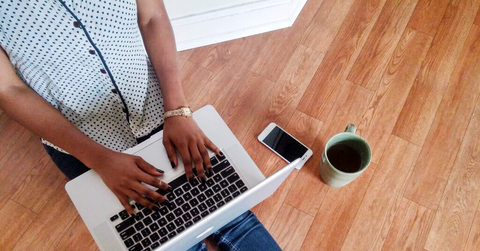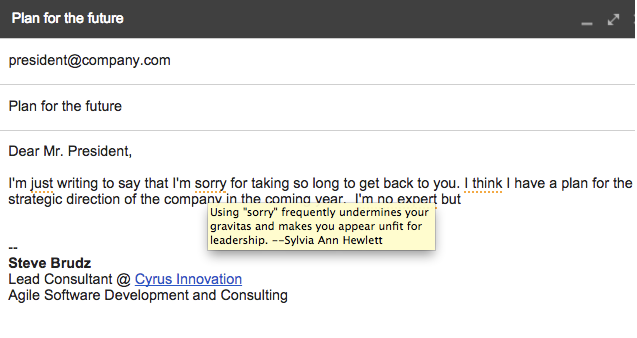New Chrome App Helps Women Write Stronger Emails, Encourages Removal of Words ‘Just’ and ‘Sorry’

It does not take statistics (although there are plenty of them) to realize that women constantly qualify messages with none other than, “I’m sorry.”
From articles, to commercials, and comedic skits – the issue has come full circle to which point now we ask, what next? Sure, one can actively try counting and remembering not to say sorry, but sometimes we need an outside warning to bring full attention to the habit.
Tami Reiss, CEO of Cyrus Innovation, provides a dynamic alternative to stop the madness through a new extension for Google Chrome. While drafting an email, “Just Not Sorry” instantly highlights words and phrases that undermine the strength your message. It functions similar to spell check. A red underline appears to point out these mishaps, including an explanation about why the said word or phrase is highlighted.

What makes the extension even better is that Tami and her team decided to open source the code so that others can create inspired apps or add further ideas and phrases to the extension.
“Just Not Sorry” is powerful not only because it stirs and creates conversation around the conflict but forces users to create alternative, non-qualifying messages instead. Often women don’t necessarily mean sorry but instead use the phrase as a means to voice they are taking other people’s feelings into account. Yet why can we not do this without saying sorry? Rather than #SorryNotSorry, we can use stronger comments like, “Thanks for your feedback, but I’m going to stick with my original idea” or “I appreciate your work but can you send me an updated draft by noon?”
Other alternatives are to replace “sorry” with “thank you” as illustrated in this fantastic comic by artist Yao Xiao. Women most frequently partake in “sorry” when they feel uncomfortable or are attempting to establish authority and needs. Thus it is no wonder men are not faced with this problem, as they are socially wired to feel comfortable, and are encouraged to establish their power and presence every time they walk into a room, bar, train, and pretty much everywhere else.
I was not first fully aware of how common and problematic saying sorry was until I caught Pantene’s 2014 #ShineStrong campaign below, where the mirror was held right up to my face.
Here is the epitome of the daily interactions where women constantly apologize, and for no reason – most often when asking or expressing whatever it is we want. It also reflects in our mannerisms and body language conveying less confidence and leadership.
None of this becomes more evident and comical than watching an exaggerated (but not entirely) version of apologizing as Amy Schumer offers in her show, Inside Amy Schumer. She does a flawless job of pointing out the various scenarios in which the word “sorry” is used where it does not below, i.e. – when correcting someone, not knowing what to do, not feeling well, expressing what we need, bumping into someone, after speaking our mind or asking for help, the list goes on and on.
Tools like “Just Not Sorry” in addition to our efforts to call each other out are the only way we can combat this unfortunate habit we’ve been ill socialized to commit. However, we must also be careful when it comes to this mentality of policing women’s speech. Too often, there’s scrutiny and finger pointing about the things women need to adjust in order to achieve in today’s society, but at a certain point we need evaluate the society that forces women to feel they need to say “sorry” before stating their opinions.





